- Home
- Sarah Pinborough
Mayhem
Mayhem Read online
First published in Great Britain in 2013 by
Quercus
55 Baker Street
7th Floor, South Block
London
W1U 8EW
Copyright © 2013 Sarah Pinborough
IM Fell font copyright © 2010 Igino Marini
Tangerine font copyright © 2010 Toshi Omagari
The moral right of Sarah Pinborough to be identified as the author of this work has been asserted in accordance with the Copyright, Designs and Patents Act, 1988.
All rights reserved. No part of this publication may be reproduced or transmitted in any form or by any means, electronic or mechanical, including photocopy, recording, or any information storage and retrieval system, without permission in writing from the publisher.
A CIP catalogue record for this book is available from the British Library
ISBN 978 1 78087 125 7 (HB)
ISBN 978 1 78087 126 4 (TPB)
ISBN 978 1 78087 127 1 (EBOOK)
This book is a work of fiction. Names, characters, businesses, organizations, places and events are either the product of the author’s imagination or are used fictitiously. Any resemblance to actual persons, living or dead, events or locales is entirely coincidental.
You can find this and many other great books at:
www.quercusbooks.co.uk and
www.jofletcherbooks.com
For all the writers who have entertained me,
taught me and inspired me; some who are still
among us, and some who are long gone.
The words live on.
PREFACE
Although I have stuck closely to factually reported events that took place during the period of the Thames Torso murders, I must confess to having taken some liberties with the characters you will find between these pages. Many of the players in this novel are real people from history, but for the sake of my story, and Murder to follow, I have taken some liberties with their personal lives and, of course, their personalities. I send my apologies to all of them, but I trust their souls give me their forgiveness. This is, after all, a novel, and not a history book.
Personally, if someone chooses to breathe life into me again, between the pages of a book a hundred years after I die, I hope that whatever is left of me in the wind and the rain would smile a little, and take whatever changes they made to my life with good humour.
These murders however, did take place. And they were never solved.
‘The only difference between me and a madman is that I am not mad.’
Salvador Dali
PART ONE
1
Paris. November, 1886
He was quite handsome. A little thin, perhaps, and there was a strange mottled hue to his skin that made her think the consumption might have made a claim on him, but he had his own teeth and the air of a gent – if you could ever call an Englishman a gent – that put him a cut above her normal clientele. He was also paying her well. She smiled at him, even though he appeared less inclined to speak to her now they were alone than when he had first seen her. That did not concern her – he was English, after all, and although his French had sounded good, it might be limited.
She didn’t mind; talking could be more work than the other. There was always the chance of saying the wrong thing and then suddenly your lip was split and your eye blackened, and then there would be no work until they healed. Quiet was fine – and quiet normally meant quick, so even better.
The night was cold and she pulled her shawl a little tighter around her shoulders as she followed him down into the side streets of Montrouge to where his lodging rooms must be. A cold wind with winter on its breath twisted through the narrowing streets and they were left in midnight gloom as the glow of light from the cafés in the square faded. She sniffed, her nose running slightly, and then caught her breath as she tripped on the uneven cobbles. He grabbed her without breaking his own stride and pulled her firmly beside him.
‘You’re stronger than you look, Englishman,’ she said with a smile. There were gaps where a few of her own teeth were missing, but she knew her smile was still pretty enough for a girl in her position. ‘I like that.’ She laughed and leaned into him, as much clumsy flirtatiousness as because she could barely see the ground beneath her feet and her head was swimming slightly. She had a head for wine – in her business you had to – but tonight she had drunk too quickly, needing that inner warmth now the alleyways where she normally plied her trade were getting uncomfortably cold. When your skirt was hitched up around your waist and your cheek was pressed into the rough stone to try and stop them pushing their stinking tongues into your mouth, you felt even the lightest of chill breezes.
He did not react to her laughter, but she didn’t mind. He was lost in his own world somewhere, perhaps feeling premature guilt for the deed he had not yet done. He probably had a wife at home, sitting bolt upright in a dark parlour, her legs primly pressed together, everything between them religiously dry. She snorted to herself.
They rounded a corner and she was surprised when he stopped in front of a small artisan’s workshop. She had not expected he would be taking her anywhere too extravagant – his coat and trousers were worn, though they were still fine clothes. She had guessed he would be staying in one of the nearby lodging houses, not the smartest of addresses, but clean and comfortable. She had been looking forward to feeling the soft sheets beneath her, and if her luck had been in, he might have fallen asleep, and then she could have slept in comfort alongside him until he woke and threw her out.
She frowned as he tugged the wooden door open: it wasn’t likely to be warm in there, though at least it would be out of the wind. She had been fucked in too many strange places to feel any concern, though she was disappointed. Mainly she just felt a weariness that even the wine could not fight. Her English gent had already paid, so no doubt he would take his time. He was not doing it twice, though, no matter how many francs he had already handed over.
‘I like my privacy,’ he muttered, as if in explanation, and ushered her inside. He closed the door and then turned on a small gas lamp that cast long shadows across the dusty floor. Her heart sank further. The place was dirty and looked neglected. She thought she could make out a table in the far corner, but the meagre light fighting its way through the grimy glass housing did not reach that far.
He moved closer until they were standing face to face. He grasped her upper arms. Once again she was surprised by his strength, especially when he looked so sickly. She ignored the purplish patches on his slightly bloated face, instead staring into his blue eyes. He looked nervous, and she warmed to him for that. She was a kind-hearted girl.
‘Don’t worry, we’ll have a nice time,’ she said, smiling and tilting her head coquettishly. She imagined he would like that. ‘Just you leave it up to me.’ She stretched her hand down to rub between his legs and gasped slightly – he fired up fast, this one – but he squeezed her arms tighter and pushed her further into the workshop. She was a little shocked by his sudden roughness, and tripped over her feet, and once again he held her up.
‘You don’t strike me as the rough type, cheri.’ She laughed a little, wanting to lighten the sudden tension. ‘Why don’t we slow it down? Why don’t you—?’
‘Do you see it?’ He shook her slightly. ‘Behind me – can you see it?’
For the first time that evening, something unpleasant unfurled in her stomach, hinting at bad choices made – the worst kind of choices. She looked into those blue eyes again. They were wide, intense, and she realised she had misread them. This wasn’t nerves, or shy fear of sex, this was something else, something completely other. This was madness. Her heart thumped loudly and the last warmth of drunkenness dissipated into cool dread.
‘Why don’t you let
me—?’
‘Can you see it?’ he hissed, spraying spit onto her face. She flinched, both from him and the sour stench of his breath. He was sick, she was sure about that. The chill in her gut spread into her limbs and suddenly she was trembling.
‘You can have your money back. Just let me go.’ She tried to wriggle free, but his hands were clenched around her arms like vices. The splintered edge of the table behind her dug into her thighs. Metal clanked against metal and she saw tools spread across the tabletop. What were they for? Tears pricked suddenly at the corners of her eyes and she sniffed them away. She was being foolish. He was mad, she could see that, but that didn’t mean he was going to hurt her. The rush of blood in her ears and the panic loosening her bladder made her thoughts unconvincing.
‘You must see it,’ he continued, ‘behind me – right behind me! You must see it!’
She stared into the shadows over his shoulder. Maybe if she placated him then he’d calm down. She focused on the closed door and the lamp. They were so close, and yet so far away. She needed him to relax – if he relaxed, then she could get away. She was sure of it.
‘I don’t know,’ she stuttered, her mouth dry. Her eyes flicked from his face to the door behind him. ‘There’s something there … I think … maybe if we get closer to the light – maybe then I could see properly?’ She licked her lips. ‘Please, if we go near the door – where the light is – then I can look. I’m sure I can see something.’ She was speaking quickly and she wondered if he even understood her. She saw her own terrified face reflected in his dark orbs as he stared at her.
A frown crept across his face and settled in a ripple of wrinkles on his forehead. After a moment it twisted into a sneer.
‘You cannot see it,’ he whispered, eventually. ‘You cannot.’ He smiled at her, and she found that she was sobbing. ‘But I will tell you a secret,’ he whispered into her ear. There was a moment’s pause, and in it she held her terrified breath.
‘It can see you.’
*
Dawn was merely a grey chill when screams tore through the still-sleeping town. Montrouge rose early that day, both sleep and tranquillity lost to them. Within an hour of the discovery, police were examining the remains that had been left so callously – so sacrilegiously – on the steps of the church, the town’s quiet place of sanctuary from the everyday toils of life. That morning there was no quiet. Even in the silence, the horrors of the crime disallowed peace.
The torso – the head, right arm and both legs were missing – belonged to a young woman. One breast had been brutally cut off, but it was quite clear from what remained that the victim was female. The police and surgeon talked amongst themselves before declaring that she could not have been murdered where she had been found; there was not enough blood. The townsfolk had become almost one in their appalled shock, and somehow this detail disturbed them even more than if the poor woman had been cut to pieces on the church steps. If he hadn’t killed her there, then in whose barn or outhouse had he committed his heinous crimes? A thorough search found no evidence, and neither did it find the missing body parts. The town did not sleep well that night, nor for many more to come. The townsfolk prayed that the wickedness that had come to their town had simply been passing through.
Later, when the torso had been taken for further investigation, it was discovered that the woman, suspected to be a missing local prostitute, was also missing her uterus.
The town prayed harder after that.
2
The Times of London
May 16, 1887
ON SATURDAY the coroner for South Essex, Mr. C. C. Lewis, opened an enquiry at the Phoenix Hotel, Rainham, into the circumstances attending the death of a woman, a portion of whose body was discovered in the Thames off Rainham on Wednesday last, wrapped in a piece of coarse sacking.
* * *
Essex Times – South Essex, London June 8, 1887
RAINHAM,
THE RAINHAM MYSTERY
On Sunday morning great excitement was caused on the Victoria Embankment on its being made known that a portion of the mutilated remains of a female had been picked up near the Temple Pier. The Thames Police were immediately communicated with, and on their rowing out to the pier a portion of a human leg was handed over into their possession. It appears that at ten o’clock on Sunday morning the attention of J. Morris, pierman at the Temple, was drawn to a large parcel that was floating near the lower side of the pier. On opening it Morris discovered the thigh of a human person wrapped in a piece of canvas and secured with a piece of cord …
* * *
The Times of London June 13, 1887
THE RAINHAM MYSTERY
… careful examination of the remains (those of a woman), and was satisfied beyond doubt that they formed part of the body to which the pelvis, recently found on the Essex shore, belonged. His (Dr. Galloway) theory that the dissection was performed by a man well versed in medical science was more than strengthened. The sacking in which the trunk was enclosed was exactly similar to that found at Rainham and off the Thames Embankment.
* * *
The Times of London July 21, 1887
THE RAINHAM MYSTERY
The various human remains, which have been found from time to time at Rainham, Essex, in the Thames off Waterloo Pier, on the foreshore of the river off Battersea pier, and in the Regent’s canal, Kentish Town, the remains comprising the arms (divided), the lower part of the thorax, the pelvis, both thighs, and the legs and feet, in fact the entire body excepting the head and upper part of the chest, are now in the possession of the police authorities.
3
London. October, 1888
Dr Bond
‘How much further?’ The shafts of bright sunlight filling the building site above were finally petering out and leaving us in a cool, grey darkness that felt clammy against my skin.
‘A little way, Dr Bond,’ Hawkins said. The detective was grim. ‘It’s in the vault.’ He held his lamp up higher. ‘We’re lucky it was found at all.’
Huddled over like the rest of the small group of men, I made my way under the dark arches and down stairways from one sub-level to the next. We fell into a silence that was marked only by the clatter of heels moving urgently downwards. I’m sure it wasn’t just I who found the gloom to be claustrophobic – especially given what we knew to be waiting for us in the bowels of this building – and I’m sure part of our haste was simply so we could face what we must and get back to the fresh air as quickly as possible.
The workmen above had downed their tools, adding to the eerie quiet. We were a long way down, and with the walls damp and rough beside me, I couldn’t shake the feeling that I was in a tomb rather than the unfinished basement of what was to be the new Police Headquarters. But perhaps I was – an unintentional tomb, of course, but a resting place of the dead all the same. I shivered. There had been enough death of late, even for someone like me, who was trained in all its ways. Recently I had begun to think that soon this city would be forever stained in cold, dead blood.
Finally, we made our way down the last few steps and arrived at the vault. It was time to work.
‘They moved it over here before they opened it,’ Hawkins said, standing over a lumpen object nearby, ‘where there was better light to see it.’ The foreman and the poor carpenter who had found and unwrapped the parcel were keeping their distance, shuffling their feet as they stayed well clear of what lay at the detective’s feet. As I looked down, I found I did not blame them.
‘Dear Lord,’ I muttered. After the slayings of recent weeks I had thought we must all be immune to sudden shock, but this proved that was not the case. My stomach twisted greasily and I fought a slight tremble in my hands. More gruesome murder in London. Had we not seen enough? The parcel the workmen had found was approximately two and a half feet long. It had been wrapped in newspaper and tied with cheap twine, the ends now hanging loose where they had been cut open to reveal the horrific secret inside.
‘We’ve not touched it since,’ the foreman, a Mr Brown, said nervously. ‘Fetched the constable straight away, we did, an’ he stayed with it while we fetched the detective. We ’aven’t touched it.’
He didn’t need to repeat himself to convince me. Regardless of the sickly stench of rot that now filled the air, who would choose to touch this? The woman’s torso was lacking arms, legs and a head, and across its surface and tumbling from the severed edges was a sea of maggots that writhed and squirmed over each other as they dug into the dead flesh. In the quiet of the vault we could hear the slick, wet sound made by the seething maggots. Here and there they dropped free to the black ground below.
I fought a shiver of repulsion. Whoever this woman was – and despite the physical trauma it was clear this was the torso of a woman – her death was no recent event.
I crouched lower to examine the damaged body more closely, and held the light close as I bent down to the floor in order to peer into the largest cavity. What was left of her insides was a mess: whoever had done this had not been content with just amputating her limbs. Much of her bowel and her female internal organs had also been removed. This killer had taken his time.
Beyond my obvious disgust, I tried to muster some other emotion, empathy of some kind for this poor creature’s fate, but I could not. It was the madness of it all that haunted me, not the deeds themselves. Further to that, this woman no longer had a face with which to plague my sleepless nights – unless that was somewhere else in this dark pit, lying as yet undiscovered. But I doubted that someone would go to the lengths of removing the most personal item of the body if they intended to simply leave them close by. From beyond the vault came the sound of vomiting. One of the younger constables, no doubt. I felt a slightly weary envy at that: oh, to still be so easily affected by the macabre acts of others.

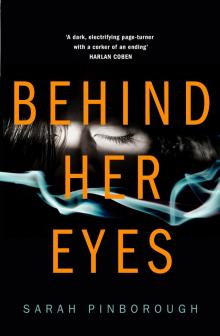 Behind Her Eyes
Behind Her Eyes The Chosen Seed: The Dog-Faced Gods Book Three
The Chosen Seed: The Dog-Faced Gods Book Three Dead to Her
Dead to Her Cross Her Heart: A Novel
Cross Her Heart: A Novel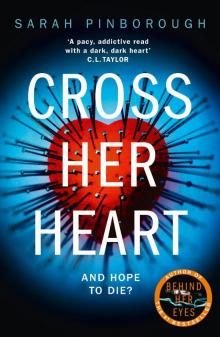 Cross Her Heart
Cross Her Heart Into The Silence
Into The Silence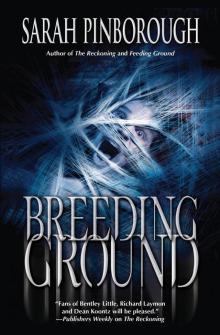 Breeding Ground
Breeding Ground The Death House
The Death House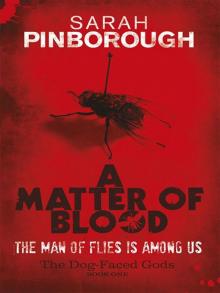 A Matter Of Blood (The Dog-Faced Gods Trilogy)
A Matter Of Blood (The Dog-Faced Gods Trilogy)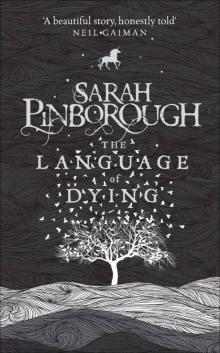 The Language of Dying
The Language of Dying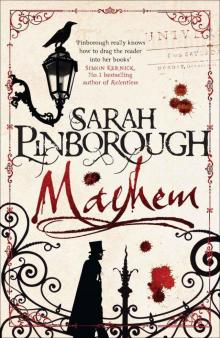 Mayhem
Mayhem Murder
Murder Torchwood_Long Time Dead
Torchwood_Long Time Dead Beauty
Beauty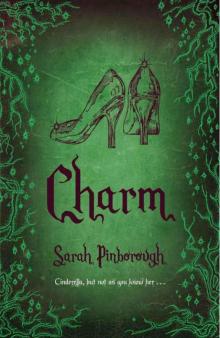 Charm
Charm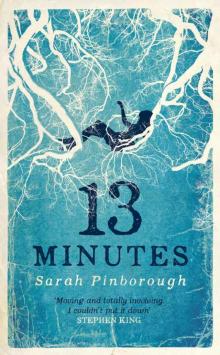 13 Minutes-9780575097407
13 Minutes-9780575097407 The Chosen Seed: The Dog-Faced Gods Book Three (DOG-FACED GODS TRILOGY)
The Chosen Seed: The Dog-Faced Gods Book Three (DOG-FACED GODS TRILOGY)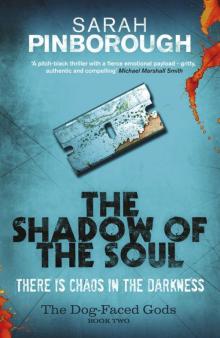 The Shadow of the Soul: The Dog-Faced Gods Book Two
The Shadow of the Soul: The Dog-Faced Gods Book Two Into the Silence t-10
Into the Silence t-10